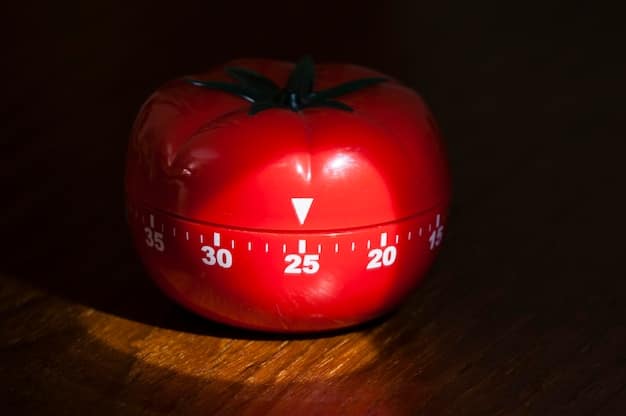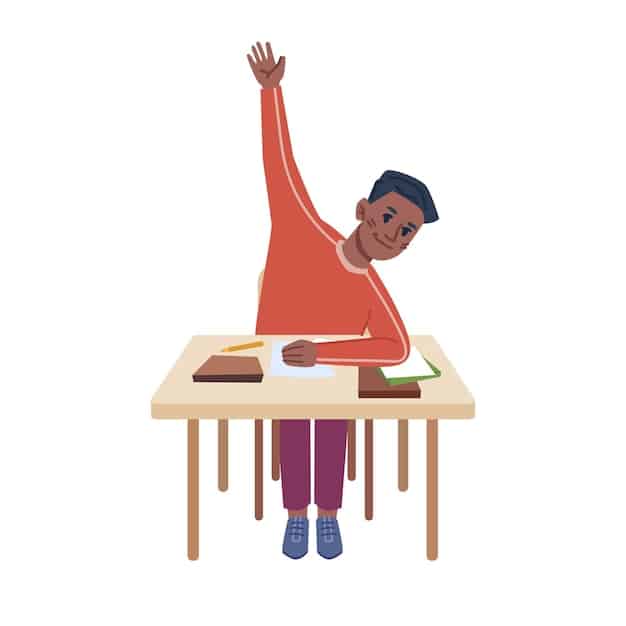Boost Your Brain: The Importance of Short Breaks for 12% More Focus

Understanding the importance of breaks is crucial for maintaining optimal concentration levels; research indicates that incorporating short intervals can significantly enhance focus by up to 12%, leading to improved study efficiency and overall cognitive performance.
Ever feel your focus slipping away during a long study session? You’re not alone. But what if the solution was as simple as taking a few minutes to step away? Discover the importance of breaks: how short intervals can boost your concentration by 12%, transforming your study habits for the better.
Unlock Your Potential: Why Breaks Matter
Many students push themselves relentlessly, believing that the more hours they put in, the better their results will be. However, this approach can lead to burnout and decreased productivity. Understanding why breaks are so important is the first step toward optimizing your study strategy.
Taking regular breaks isn’t about being lazy; it’s about being smart. It’s a way to recharge your brain, allowing you to return to your work with renewed energy and focus.
Combating Decision Fatigue
Prolonged focus can lead to decision fatigue, a state where your brain becomes overwhelmed and less able to make sound judgments. Breaks help alleviate this fatigue, allowing you to make better choices and solve problems more effectively.
Improving Memory Consolidation
During breaks, your brain has time to process and consolidate the information you’ve been studying. This process, known as memory consolidation, is crucial for long-term retention.
- Breaks help to clear your mind, making space for new information.
- They allow your brain to organize and categorize the material you’ve been learning.
- Breaks can improve your ability to recall information later on.
Ignoring the importance of breaks can negatively impact your cognitive fitness. Make sure you have healthy studying habits as a student.
Ultimately, recognizing the importance of breaks is about recognizing the limits of your cognitive resources. Just as an athlete needs rest to recover and rebuild, your brain needs breaks to function at its best. Incorporating regular intervals into your study routine will not only improve your concentration but also enhance your overall learning experience.

Pomodoro Power: The 25-Minute Advantage
Now that you understand the importance of breaks, let’s explore a specific technique that can help you incorporate them effectively. The Pomodoro Technique is a popular time management method that involves working in focused 25-minute intervals, separated by short breaks.
This technique is based on the idea that short bursts of focused work, followed by brief periods of rest, can lead to greater productivity and concentration.
Implementation of Pomodoro
The Pomodoro Technique is simple to implement. Set a timer for 25 minutes and work on your task without interruption. When the timer goes off, take a 5-minute break. After every four “pomodoros” (25-minute work intervals), take a longer break of 20-30 minutes.
Why It Works
The Pomodoro Technique works because it helps to break down large tasks into smaller, more manageable chunks. It also forces you to take regular breaks, preventing mental fatigue and improving your focus.
- It provides a structured approach to time management.
- It encourages focused work and minimizes distractions.
- It helps prevent burnout.
Using the Pomodoro Technique can improve the effectiveness of your study habits, improving concentration by 12%, if not more.
In conclusion, the Pomodoro Technique is a powerful tool for boosting your concentration and productivity. By working in focused 25-minute intervals and taking regular breaks, you can optimize your study sessions and achieve better results.
Micro-Breaks: The Secret Weapon for Sustained Focus
While techniques like the Pomodoro are beneficial, it’s also essential to understand the power of micro-breaks. These are even shorter breaks, lasting just a minute or two, that can be taken more frequently throughout the day.
Micro-breaks are a secret weapon for sustained focus, especially when you find yourself struggling to concentrate on a task.
How to Integrate Micro-Breaks
Incorporate micro-breaks by simply stepping away from your desk, stretching, looking out the window, or doing a quick breathing exercise. The key is to do something that allows you to mentally disengage from your work for a brief period.
These should be incorporated to take advantage of knowing the importance of breaks during studying and work sessions.
Benefits of Micro-Breaks
Micro-breaks offer several benefits, including reduced eye strain, improved posture, and increased alertness. They can also help to prevent mental fatigue and improve your overall mood.
- Reduced eye strain through looking at distant objects.
- Better posture through stretching.
- Improved cognitive function with simple breathing exercises.
Incorporate micro-breaks every ten to twenty minutes to keep your mental capacity at it’s best.
In summary, micro-breaks may seem insignificant, but they can have a profound impact on your concentration and productivity. By taking these short, frequent breaks, you can sustain your focus throughout the day and prevent mental fatigue.

Mindful Moments: Cultivating Awareness During Breaks
Breaks aren’t just about stepping away from your work; they’re also an opportunity to cultivate mindfulness. By incorporating mindful moments into your breaks, you can further enhance your concentration and reduce stress.
Mindfulness involves paying attention to the present moment without judgment. It’s about noticing your thoughts, feelings, and sensations without getting caught up in them.
Practicing Mindfulness During Breaks
During your breaks, try focusing on your breath, paying attention to the sensation of each inhale and exhale. You can also try a short meditation or simply observe your surroundings with curiosity and openness.
Benefits of Mindfulness
Mindfulness has been shown to reduce stress, improve focus, and enhance emotional regulation. By practicing mindfulness during your breaks, you can reap these benefits and return to your work feeling refreshed and centered.
- Reduce stress with breathing exercises.
- Improve focus through awareness activities.
- Enhance your mood with meditation practices.
When studying, always allow for mindful moments to increase concentration by 12%.
In conclusion, incorporating mindful moments into your breaks is a powerful way to enhance your concentration and reduce stress. By practicing mindfulness, you can cultivate awareness, improve your emotional regulation, and return to your work feeling refreshed and centered.
Optimal Environment: Setting the Stage for Focused Breaks
The environment in which you take your breaks can also impact their effectiveness. Creating an optimal environment that promotes relaxation and rejuvenation can enhance the benefits of your breaks.
This involves minimizing distractions, creating a comfortable space, and incorporating elements that promote relaxation.
Creating a Break-Friendly Space
Designate a specific area for taking breaks, away from your desk and work-related materials. This space should be comfortable, quiet, and free from distractions.
Incorporating Nature
If possible, incorporate elements of nature into your break environment, such as plants, natural light, or a view of the outdoors. Studies have shown that exposure to nature can reduce stress and improve focus.
Music and Aromatherapy
- Play soft, relaxing music to soothe your mind.
- Use aromatherapy to create a calming atmosphere
- Minimize distractions that may hinder the quality of the breaks
Make sure to optimize your surroundings to take advantage of the importance of breaks when studying.
In summary, creating an optimal environment for your breaks can significantly enhance their effectiveness. By minimizing distractions, creating a comfortable space, and incorporating elements that promote relaxation, you can maximize the benefits of your breaks and return to your work feeling refreshed and focused.
Tracking and Refining: Measuring Your Break Effectiveness
To truly optimize your break strategy, it’s essential to track and refine your approach. This involves monitoring the effectiveness of your breaks and making adjustments as needed to maximize their benefits.
Tracking and refining allows you to identify what works best for you and tailor your break strategy to your individual needs and preferences.
Monitoring Your Focus Levels
Pay attention to your focus levels before and after each break. Notice how you feel mentally and physically, and track any changes in your concentration, energy, and mood.
Experimenting with Different Break Activities
Try different break activities, such as stretching, meditating, listening to music, or reading a book. See which activities leave you feeling the most refreshed and focused.
Make it Personal
- Find which activities you enjoy the most.
- Record your feelings before and after a certain activity.
- Track the data in a journal or app.
Don’t be shy from testing variables to maximize concentration by 12%, and more.
In conclusion, tracking and refining your break strategy is crucial for maximizing its effectiveness. By monitoring your focus levels, experimenting with different break activities, and making adjustments as needed, you can tailor your approach to your individual needs and preferences, ensuring that your breaks are as beneficial as possible.
| Key Point | Brief Description |
|---|---|
| 🧠 Decision Fatigue | Breaks help alleviate mental exhaustion, improving judgment. |
| ⏱️ Pomodoro Technique | Work in 25-minute intervals with short breaks for focused study. |
| 🧘 Mindful Moments | Incorporate mindfulness during breaks to reduce stress and sharpen focus. |
| 🌿 Optimal Environment | Create a relaxing break space with nature and minimal distractions. |
Frequently Asked Questions
▼
It’s recommended to take a short break every 25-30 minutes to maintain focus and prevent mental fatigue. Longer breaks should be taken after every few hours of studying. Tailor this to suit your studying needs!
▼
Good activities include stretching, walking, listening to music, meditating, or engaging in a hobby. Avoid activities that require intense focus or screen time, as this can defeat the purpose of the break.
▼
Yes! Studies show that taking regular breaks can boost concentration and productivity. Breaks allow your brain to rest and process information, leading to improved focus when you return to studying.
▼
The Pomodoro Technique is a time management method that involves working in focused 25-minute intervals, separated by 5-minute breaks. After every four intervals, a longer break of 20-30 minutes is taken. This can improve study efficiency!
▼
To make your study breaks more effective, ensure you are completely disengaging from your studies. Create a relaxing environment, try different relaxation techniques, and experiment with break durations to find what works best for you.
Conclusion
In the pursuit of academic success, understanding the importance of breaks: how short intervals can boost your concentration by 12% is paramount. By incorporating regular breaks into your study routine, you can recharge your brain, improve your focus, and optimize your learning experience, leading to better grades and reduced stress.





